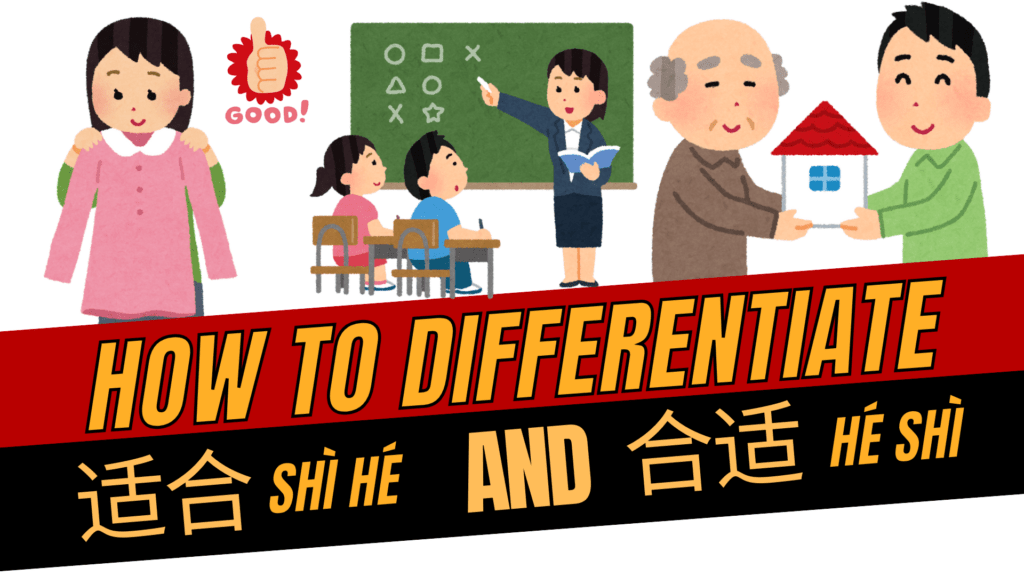Understanding the distinction between 适合 (shì hé) and 合适 (hé shì) is crucial for improving Chinese fluency and avoiding common mistakes. These two concepts refer to “suitability” but are used in distinct contexts. Knowing when to use them appropriately can help you communicate yourself more clearly in regular discussions, business settings, and more. 适合 (shi he) is a verb and 合适 (he shi) is an adjective. Using them incorrectly can confuse native speakers and hamper your communication abilities. In this post, we will show you how to properly use these two words with practical examples to help you utilize them confidently.

What is SHI (适) and He (合)
适, pronounced as shì, is an HSK Level 4 Chinese word. It has the meaning of fits well, appropriate, or is suitable for a particular person, situation, or purpose in English. 适 has 10 strokes, and its structure is made up of components 辵 (chuò), to walk; walking), which is the radical, and 舌 [ shé ] tongue.
The other Chinese character, 合 hé, means to join, to fit, to be equal to, whole, or together. It has 6 strokes, and it is made up of the radical 口 kǒu (mouth) and another component 亼 [jí] (to assemble, to gather together).
Frequently used words or phrases
适当 shì dàng – Appropriate, proper, suitable
适应 shì yìng – To adapt, to adjust, to get used
适用 shì yòng – Applicable, to apply (to a situation)
合作 hé zuò – Cooperation, to cooperation
集合 jí hé – To gather, assembly
合法 hé fǎ – Legal, lawful
Dialogue using 适合 合适
Differences between 适合 and 合适
1. 适合and 合适 are grammatically different. 适合 is a verb (动词), whereas合适 is an adjective (形容词)
这天气很适合郊游。Zhè tiānqì hěn shìhé jiāoyóu.
This weather is perfect for an outing.
房子的大小正合适。Fángzi de dàxiǎo zhèng héshì.
The size of the house is just right.
2. 适合 must be followed by an object but not 合适
他哪里不适合你?Tā nǎlǐ bù shìhé nǐ?
In what way is he not suitable for you?” or “Why isn’t he a good match for you?”
You cannot use 合适 because of the object “你” in the sentence.
他的性格和生活习惯都不合适。Tā de xìnggé hé shēnghuó xíguàn dōu bù héshì.
His personality and lifestyle habits are not compatible (appropriate).
You cannot use适合 because there is no object in the sentence. If you want to use 适合, you will need to change the sentence to他的性格和生活习惯都不适合我。
3. 合适 can have the meaning of logical or reasonable. 适合 does not have such meaning.
你这样和父母说话合适吗?Nǐ zhèyàng hé fù mǔ shuō huà hé shì ma?
Is it appropriate for you to talk to your parents like this?
你这样做不合适。Nǐ zhè yàng zuò bù hé shì.
What you’re doing is not appropriate.
You now understand the main distinction between 适合 and 合适! Remember that 适合 is a verb, while 合适 is an adjective. With experience, you’ll feel more comfortable employing them in appropriate contexts. Learning these small variations not only improves your Chinese skills, but also allows you to express yourself more naturally. Keep practicing, and don’t be concerned if you make mistakes; it’s all part of the process. Thank you for learning with us; we’ll see you in the next lesson! Happy studying!
For video presentation of this lesson, click here.
